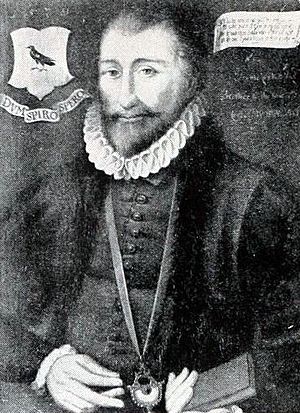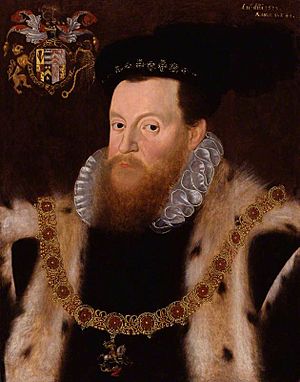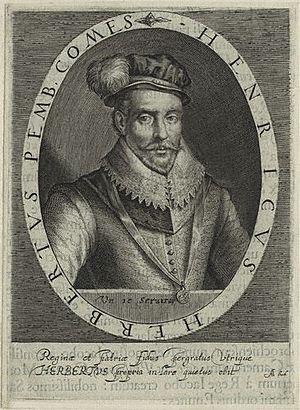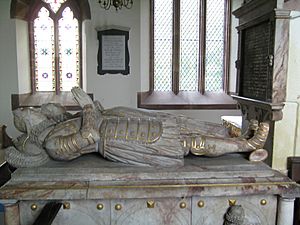Jerome Corbet facts for kids
Jerome Corbet (born in the 1530s; died 1598) was an important politician and lawyer during the time of Queen Elizabeth I. He came from a wealthy family in Shropshire, England. Jerome was the younger brother of Sir Andrew Corbet. Like his brother, he supported the new religious changes happening in England at the time. He became a Member of Parliament (MP) for Bridgnorth and also worked for the Council in the Marches of Wales, which helped govern parts of Wales and England.
Contents
Family and Early Life
Jerome Corbet was the youngest son of:
- Roger Corbet (died 1538). His family, the Corbets, were very rich and powerful landowners in Shropshire. They had been connected to the area since the Norman Conquest in 1066.
- Anne Windsor (died 1550–51). Her family, the Windsors, were also very old and important. They were even in charge of Windsor Castle for many years. Anne's father, Sir Andrew Windsor, was very wealthy. He managed a lot of the king's money.
Jerome's parents married because Roger Corbet's father died when Roger was young. This meant that Sir Andrew Windsor, Anne's father, gained control over Roger's marriage. He arranged for Roger to marry his daughter, Anne. Both the Corbet and Windsor families had strong connections. These connections were very helpful for Jerome. He needed to find his own way in life because he would not inherit the family's main estates.
Roger Corbet, Jerome's father, died in 1538. His will mentioned three younger sons besides Andrew, who was the oldest. However, Jerome's name was not specifically written down. This suggests Jerome was still a baby when his father died. Jerome and his brothers were each promised about £6 13s. 4d. per year once they turned 21. This money would help them until they could earn at least £20 a year on their own.
When Jerome's mother, Anne, died around 1551, she was still trying to help her younger children. She first wanted to make sure her unmarried daughter, Elizabeth, had money for her marriage. Anne also set aside £9 each year for Jerome's education.
Becoming a Lawyer
Jerome decided to study law, just like his uncle Reginald Corbet. In 1555, Jerome joined the Middle Temple, which was one of the main places to train as a lawyer in London. Records show that his brother Walter was also studying there at the time.
- On June 22, 1555, Jerome Corbet was allowed to share a room with his brother Walter.
People usually started legal training around age 18. So, Jerome's admission date suggests he was born around 1537.
By 1569, Jerome Corbet had officially become a lawyer. He was known as an "utter barrister," which meant he could argue cases in court.
- On June 27, 1569, Jerome Corbet was given a room in the Middle Temple.
This room belonged to his uncle, Edmund Windsor. Two years later, Jerome was sharing this room with his cousin, Edward Windsor, 3rd Baron Windsor.
- It was decided that his cousin, Lord Windsor, could use the room whenever he wanted. Jerome would move out but would be paid for his costs.
Working in Government
The Council in the Marches
In 1575, Jerome Corbet was chosen to be part of the Council in the Marches of Wales. This Council was like a regional government. It managed many parts of Wales and the English counties along the border, including Shropshire, where Jerome lived. Some people thought he was "too slow" for the job. However, at this time, his brother Sir Andrew Corbet was leading the Council. Jerome attended meetings regularly and helped settle disagreements.
Around this time, Jerome married Dorothy Poyner. She was a wealthy widow who owned land and a home at Beslow, near Wroxeter. When her father died in 1578, Jerome gained this property. He likely stopped working as a private lawyer in London. Instead, he focused on government work in his home county. In 1575, he became a Justice of the Peace (J.P.) in Shropshire. J.P.s were local officials who helped keep law and order. From 1580, he was a key J.P. in Shropshire, Gloucestershire, Herefordshire, and several Welsh counties. This shows he had proven himself valuable. He continued to serve on the Council in the Marches even after his brother Sir Andrew died in 1578. He also kept his position when Sir Henry Sidney, the Council's president, died in 1586. The new president, Henry Herbert, 2nd Earl of Pembroke, had similar ideas and energy.
Member of Parliament for Bridgnorth
In 1584, Jerome Corbet was elected as a Member of Parliament (MP) for the town of Bridgnorth in Shropshire. MPs represent their area in the national Parliament. In Bridgnorth, the town's two leaders and 24 aldermen (council members) chose the MPs. The Council in the Marches had a lot of power over these elections. As a member of the Council, Jerome was in a good position to get elected.
His family was also the richest in the county. Towns often chose lawyers to represent them in Parliament. They believed lawyers would be good at understanding and changing laws. Jerome was a wealthy, well-connected lawyer, so he was a clear choice for Bridgnorth.
This Parliament did not last long. It was elected in late 1584 and ended in September 1585. Jerome Corbet did not serve in Parliament again after this.
Death
Jerome Corbet died in 1598. He was buried in his family's chapel at Moreton Corbet church on July 30. There is no special monument for him, but a painting of him from that time still exists. The painting shows him in clothes from his era. In the top left corner, there is a Latin saying: Dum spiro spero, which means "While I still breathe, I hope."
Marriage and Children
Jerome Corbet's wife was Dorothy Poyner. She was the daughter of Thomas Poyner of Beslow. Before marrying Jerome, Dorothy had been married twice before to other landowners in Shropshire. She had children from both of these earlier marriages.
Jerome Corbet and Dorothy Poyner likely married in the 1570s. They had three children who survived:
- Anne Corbet married William Gatacre.
- Roger Corbet was Jerome's main heir. He married Jane Banister and settled in Leicestershire. His family line continued until the mid-1700s.
- Robert Corbet was Jerome and Dorothy's younger son. He lived at Beslow and died without having children. He left his property to his half-brother, Francis Wolryche.
Jerome and Dorothy Corbet strongly disagreed with their daughter Anne's marriage to William Gatacre. The Gatacre family had different religious beliefs from the Corbets. This caused a lot of tension and disagreements within the family. Anne outlived Jerome by about six years. When she wrote her will, the disputes were still ongoing. It seems Jerome and Dorothy initially refused to give Anne a marriage settlement (money or property). However, William Gatacre took legal action, forcing them to agree. Dorothy was determined to fight, even arguing over the details of Anne's financial arrangements.
- Dorothy wrote in her will that Anne married without her parents' permission. William Gatacre, Anne's husband, then sued Dorothy. A judge ordered Dorothy to pay William a certain amount of money. In return, William was supposed to provide Anne with a "jointure," which was a guaranteed income for her. Dorothy said she had paid almost all the money, but William had not yet set up the jointure. She stated that if William made the jointure, her executors (people who carry out her will) should pay him the rest of the money. If he refused, they should keep the money and make him either set up the jointure or return the money he had already received.





